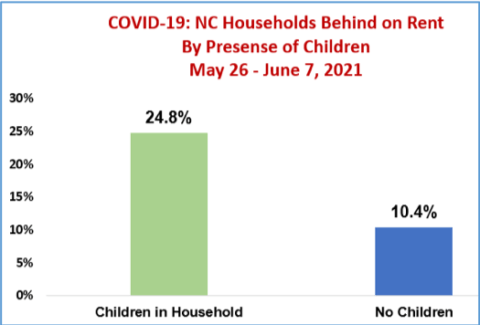Last week, the U.S. Department of Health and Human Services (HHS) Office of Child Care released new guidance to the states on the supplemental child care assistance money included in the American Rescue Plan.[1] For North Carolina, this is about $502.7 million in child care assistance funding on top of the state’s regular annual funding.[2]
The new federal guidance highly recommends that states use these funds to:
- Increase provider payment rates to better reflect the cost of high-quality child care,
- Increase child care compensation (for individuals working in child care centers and family child care homes), and
- Target assistance to under-served populations.
I have written about the need to increase child care workforce compensation and child care subsidy rates many times. The emphasis in the new guidance related to supporting under-served populations is also long past due as a much-needed priority. The COVID-19 pandemic has challenged us all. However, the pandemic has pushed more families with young children into homelessness or on the brink of homelessness. Children in families experiencing homelessness are an under-served population.

The most recent Census Bureau data from May 26-June 7, 2021, found in North Carolina:[3]
- 24.8% of families with children are behind on rent
- 40.5% of families with children who rent are worried about eviction
In May 2021, the U.S. Department of Education released the most recent Early Childhood Homelessness State Profiles,[4] which found an estimated 32,189 children under age 6 in North Carolina were experiencing homelessness before the pandemic. It is likely that number is much higher now, given the economic challenges of the past year.
Some federal support for families with children experiencing homelessness is now on the way to states. In April, the U.S. Department of Education announced $800 million in funding for school districts to better support the needs of students experiencing homelessness.[5] McKinney Vento liaisons across the state work with students experiencing homelessness and many of those students have younger siblings. On June 10, the U.S. Department of Housing and Urban Development awarded $1.1 billion for Emergency Housing Vouchers for individuals and families who are either experiencing homeless or at risk of homelessness.[6]
With the new federal child care guidance recommending that states use supplemental funds to support under-served populations from multiple funding sources, it makes sense to couple the housing support with child care assistance so that young children can be in a high-quality setting that supports their healthy development. Can families with young children experiencing homelessness be prioritized?
The Division of Child Development and Early Education (DCDEE) has a 4% set-aside to serve vulnerable populations, which includes children identified as having special needs and children experiencing homelessness or those who are in a temporary living situation. Counties establish a separate waiting list for children and families in one of these vulnerable populations. Can we develop a similar set-aside for housing and have these two issues work together? Both safe and secure housing and high-quality early learning are in the NC Early Childhood Action Plan. Children in families experiencing homelessness are among the most vulnerable of all children. They are at risk for developmental delays and may need additional social and emotional support.

Science shows the brain grows the fastest in a child’s earliest years, setting the foundation for all future learning. Families with young children, particularly infants and toddlers, should receive priority consideration for child care assistance. This would enable their parents to receive services and get their lives back together. While young children experiencing homelessness are prioritized for Head Start,[7] there are not enough spaces to accommodate all eligible children.
However, with more than $500 million in supplemental child care assistance newly available in North Carolina, prioritizing families with children experiencing homelessness for child care assistance should be a priority. If families had housing and child care, it would be possible to really change the life trajectory for children. That’s the potential return on investment for children with access to high-quality child care and safe and secure housing.
Additional federal funds have arrived. Guidance documents are now available. It’s time to expand the partnerships necessary to ensure young children in families experiencing homelessness have access to high-quality child care and housing. It’s doable. It’s time to prioritize it.
Additional Resource: SchoolHouse Connections just released a new report, Supporting Young Children and Families Experiencing Homelessness with American Rescue Plan Act Funds.
[1] U.S. Department of Health and Human Services, Office of Child Care, Supplemental Child Care and Development Fund (CCDF) Discretionary Funds Appropriated in the American Rescue Plan (ARP) Act of 2021, June 11, 2021.
[2] U.S. Department of Health and Human Services, Office of Child Care, ARPA Supplemental Stabilization and CCDF Discretionary Funding Allocation Tables – States and Territories, April 14, 2021.
[3] U.S. Census Bureau, Household Pulse Survey, Week 31 Household Pulse Survey: May 26 – June 7, 2021. https://www.census.gov/data/tables/2021/demo/hhp/hhp31.html
[4] U.S. Department of Education, Early Childhood Homelessness State Profiles, May 2021.
[5] U.S. Department of Education, Education Department Announces State Allocations of $800 Million in American Rescue Plan Funds to Support Students Experiencing Homelessness, April 23, 2021.
[6] U.S. Department of Housing and Urban Development, HUD Awards $1.1 Billion in American Rescue Plan Funds for Emergency Housing Vouchers, June 10, 2021.



